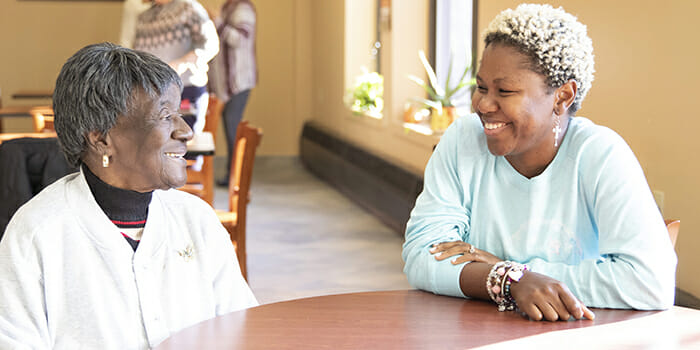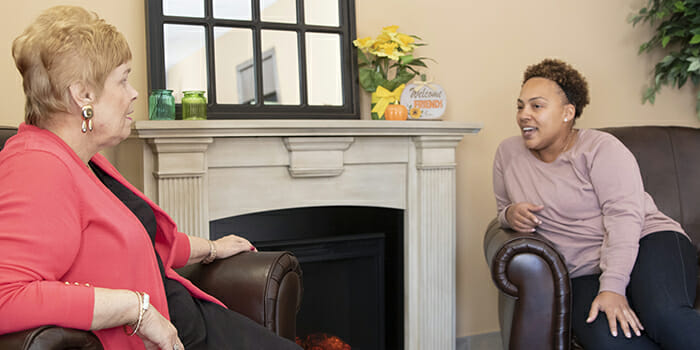Rhode Island College Pilots Intergenerational Service-learning Course
Strengthening Ties Between Generations

At Charlesgate Park West, a Providence senior housing facility, Hilda Mial, left, chats with Rhode Island College nursing senior Maria Lako

Eileen MacCathy, left, talks wtih Rhode Island College sophomore Rosilene DeOliveira at Charlesgate Park West.
This is the type of experiential learning that RIC promotes,” Galloway said. “We want to draw students into career paths that deal with elderly individuals across the disciplines. In almost any field, from psychology to counseling, people are going to be taking care of aging baby boomers. As a culture and society, we’re behind the eight ball in that regard. So, in essence, this course is workforce development, teaching students about aging and how to be advocates for potential resources the older person may need.”
The course includes reflective journaling, readings, research and a final presentation in which students describe the experiences they had with the elder adult with whom they’re matched. Students also learn about social determinants of elders’ health and barriers to staying healthy, including access and constraints related to services, transportation, finances and housing. Thus far, DeOliveira thinks her bond with MacCathy, a former school and church worker, will last well beyond the course. “She’s so positive,” DeOliveira said of MacCathy. “As a younger person, you don’t think you’re going to have much to talk about with an older person, but that’s not my experience. I think young people who are stuck in their video games and social media should volunteer more with their older counterparts because they’re fun to be around.”
Lako said Mial, a New Orleans native who worked at Rhode Island Hospital, offers first-hand insight about past events such as the civil rights movement and Pearl Harbor during their visits. She said she disagrees with the thinking that older people are fragile and helpless. “They might have to modify what they do but they still enjoy doing things,” Lako said. “ And I think they desire companionship. Loneliness can lead to depression, which can go unnoticed because older people tend not to find many opportunities to socialize.”
At present, Charlesgate is the sole location for the course but Galloway hopes to expand to other sites in the future. At the end of the semester, students, elders and the Charlesgate staff will evaluate the course to determine what worked and what didn’t. Mial said she believes the course is a worthwhile investment. “I hope this program continues,” she said. “It gives seniors a chance to talk and know how young people feel and vice-versa. You can’t judge a book by its cover.”
